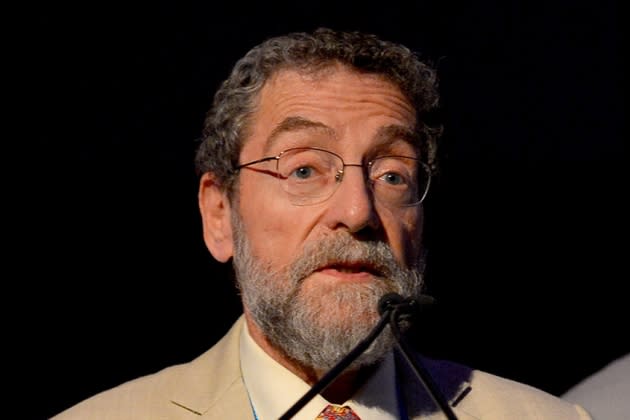Lenny Lipton, 3D Film Technology Trailblazer and ‘Puff the Magic Dragon’ Lyricist, Dies at 82
- Oops!Something went wrong.Please try again later.

Lenny Lipton, the New York-native who wrote the lyrics to what became Peter, Paul and Mary’s popular folk song “Puff, the Magic Dragon,” died on Oct. 5 from brain cancer at the Cedars-Sinai Medical Center in Los Angeles, his wife told The New York Times. He was 82.
In 1959, Lipton was a 19-year-old physics major at Cornell University. Feeling inspired after reading Ogden Nash’s poem “The Tale of Custard the Dragon,” he borrowed the typewriter of his schoolmate Peter Yarrow — one-third of the Peter, Paul and Mary trio — to scribe a creation of his own. But when Yarrow saw Lipton’s poem abandoned at the keys, he decided to put it to music, becoming the well-known 1963 song “Puff, the Magic Dragon.”
More from Variety
Lipton received a co-writer credit on the track, which was an instant hit among listeners. Through royalties, Lipton generated enough money to move to the Bay Area in California, where he became cohorts with a diverse scene of independent filmmakers. It was here he was launched into the film industry and began working on experimental shorts like 1969’s “Doggie Diner and the Return of Doggie Diner.”
Lipton also entered into the studio system during his career, receiving a production assistant credit on the 1975 best picture winner “One Flew Over the Cuckoo’s Nest.”
Throughout the 70’s, Lipton wrote two books for independent filmmakers, the first titled “Independent Filmmaking” (1972) and the second titled “The Super 8 Book” (1975). Writing wasn’t new for Lipton, seeing as he secured a job at Time magazine shortly after graduating in 1962, before moving to an editor position at Popular Photography. In the years that followed, Lipton continued to contribute columns to entertainment magazines. His writings were ultimately aggregated into a compendium called “Lipton on Filmmaking” in 1979.
Lipton was also at the helm of experimentation with three-dimensional technology for filmmakers — an interest that began in to his youth, when he would draw comics with red and green crayons to view with make-shift 3D glasses. As a child, Lipton was among some of the first audiences to see 3D films in theaters. Though the early technology was far from perfect, the concept resonated with Lipton and inspired a life-long career dedicated to the craft.
The multi-talented creative held 68 patents related to 3D technology. One example is a pair of glasses with shutters that open and close in sync with the screen to deliver imagery to the viewer, dubbed CrystalEyes. The Smithsonian Institution honored Lipton for the invention of CrystalEyes in 1996.
Development for these projects was funded by Stereographics Corporation, a company Lipton created in 1980, until RealD Cinema purchased the corporation in 2005. As a result of the acquisition, Lipton worked as chief technology officer at RealD until 2009. His work remains the inspiration for RealD’s modern cinema systems.
“I had a great education at Cornell but I was a decidedly mediocre student,” Lipton said with modesty in an interview with Physics World magazine in 2007. “I am a creative and determined person and I got a lot smarter once I found a field I loved. I see the world becoming one in which children are pointed in the direction of money as an end in itself. I hate living in that kind of a world. Schools need to be more accepting of eccentric people with a different point of view because we are the people who make the difference. We are the people who invent.”
Lipton is survived by his wife, Julie, and his children, Anna, Noah and Jonah.
Best of Variety
Sign up for Variety’s Newsletter. For the latest news, follow us on Facebook, Twitter, and Instagram.
